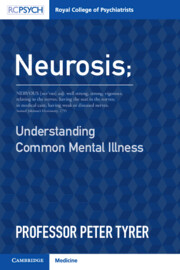‘Psychiatry cannot advance without a good classification. We have failed to achieve this, most particularly with common mental disorders. This important book by Peter Tyrer shows a way forward, giving special attention to mixed anxiety and depressive disorders, the most important diagnosis of all. It should be mandatory reading for all psychiatrists.’
David Goldberg - Professor Emeritus, Institute of Psychiatry, King's College London, United Kingdom
‘DSM-5 & ICD-11 are splitter systems that artificially divide the diagnostic pie into tiny slices. The resulting artificial and misleading ‘comorbidity’ often leads to fragmented and excessive treatments. Tyrer beautifully demonstrates the clinical realities that patients are necessarily more complicated than diagnostic systems and that flexible formulation is more important than rigid adherence to criteria sets. This is an extremely valuable book for all mental health professionals at all levels of training and experience.’
Allen Frances - MD, Professor and Chair Emeritus, Department of Psychiatry, Duke University, Durham, NC, USA, and Chair, DSM-IV Task Force
‘This highly readable book has long been needed. It is an essential reference for improving clinical thinking, whether you are a physician or a psychologist. It helps building unitary perspectives that may shed light on phenomena that would otherwise remain scattered in the patient’s story. What is shared by syndromes such as anxiety, panic, phobic disturbances and irritability may be as important as the differences between them and conditions that are apparently comorbid could be part of the same general neurotic syndrome.’
Giovanni A. Fava - MD, Clinical Professor of Psychiatry, University at Buffalo, State University of New York, Buffalo, NY, USA





